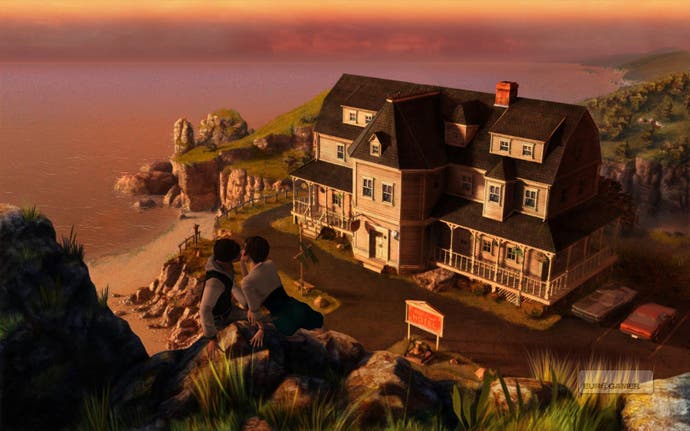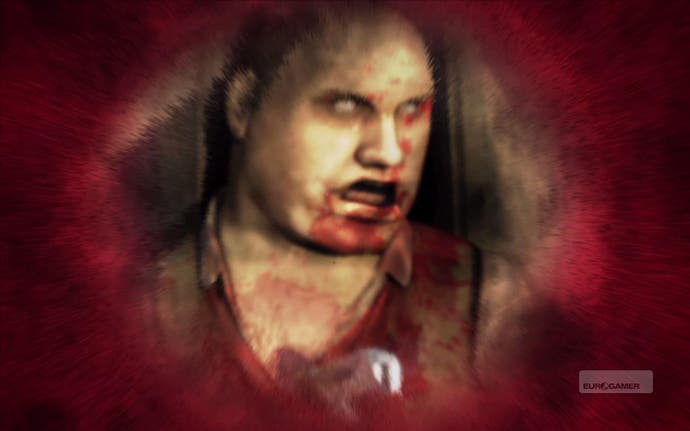Black Mirror II
Through a glass darkly.
You may not remember Black Mirror. I reviewed it, and I still couldn't remember a thing about it. But then, it was seven years ago. It was a peculiar Czech point-and-click adventure, in which you played a wretched man called Samuel Gordon - a character who went around being rude to everyone, leaving you feeling completely alienated from the experience.
Hardly a game to have gone down in legend, it's a very peculiar choice for German developers Cranberry to have created a sequel for. Stranger still, since absolutely no prior knowledge is necessary to follow the story. The "II" in the title can only hurt their chances of picking up a UK audience for what is a quite surprisingly decent adventure game.
Set in 1993, this remarkably long game begins in Biddeford, Maine. You're Darren, a student on his summer break, working in a photography store for a particularly unpleasant boss. Darren's mother, an English woman who brought her son up in Boston, had moved to Biddeford in recent years - a sleepy, uneventful town with almost nothing for a 20-something to do. And this is how things begin - sleepily, slowly, but somehow interesting.
Things start to happen. A beautiful woman, Angelina, arrives in town, and shows interest in Darren. At the same time his disabled mother is involved in a fall and ends up in a coma in the local hospital. Then that night Darren's ghastly boss is murdered, with Angelina arrested. Your task, at first, is to prove her innocence while searching for the real culprit and trying to identify a mysterious stranger you've spotted hanging around town.

However, Black Mirror II has a far larger story than this provincial murder mystery. The original Black Mirror, set in 1981, had told the tragic story of the Gordon family, following events that had occurred twelve years previously in 1969. For Darren there's something significant about the passing of twelve years, an English village called Willow Creek, and the curse on the Gordon family.
The time it takes to get to this larger story is the first interesting aspect here. That opening tale of local woes lasts hours. Spookiness is only vaguely suggested, the focus instead on giving minor characters depth, and letting you get used to being young Darren. Stories that ultimately don't feature in the game long-term - the abusive marriage of the diner owners, for instance - are fleshed out beyond simple background detail.
Uncovering secrets within the town doesn't reveal a million-year-old monster or suchlike, but instead merely the reality of people's lives. It's not stunning, it's not ground-breaking drama. If anything it's barely above soap opera. But it's a heck of a lot more than we're used to from European adventures.

However, there's an awful lot here that's painfully familiar. The first puzzle - the first one - is a bloody sliding tile puzzle. And it's not the only one in the game. Only a short while later, we're asked to piece back together a torn note. It's almost parodic. Locks must be picked, symbols decoded, ancient discs slotted into correct alignment. That you're not required to recover a key from the other side of a door with a pencil and some newspaper is a miracle. It's like a worst-of of Euro-adventure challenges, muddling up a game that otherwise promises real depth.
The inventory puzzles are, again, nothing original. But they are at least mostly very logical. Darren's magic pockets carry vast amounts, but you can invariably assume which items to combine and where to use them. It's never not satisfying to put together a bunch of tools to achieve a goal, and Black Mirror II delivers this plentifully.
In fact, there are a few knowing references. Some are nice, like Darren's remark on finding some chewing gum wrapped in aluminium foil: "I just need a paper clip, then I could build an atomic bomb." Others - well, when you're being knowing, it means you know you're getting it wrong. So when Darren remarks about how many doors he's being forced to open in increasingly silly ways, you have to wonder why the designers didn't think to listen to their own character.

